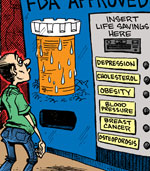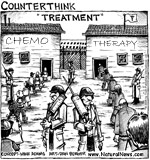Terminal Insomnia - When Sleep Deprivation Is Fatal
| Share on Facebook | Share on Twitter | Share on Google+ |
Terminal insomnia is a very rare but deadly condition. The two main kinds of terminal insomnia, fortunately, affect fewer than 100 people in the entire world.
Fatal Familial Insomnia
Fatal familial insomnia is a hereditary condition in which just one amino acid in one gene for one protein is wrong. It makes a protein in which 252 amino acids are right but 1 is wrong, called a prion. As the amount of the protein builds up over decades, it eventually has devastating effects on the brain.
The mutation in fatal familial insomnia is in a gene called PrP. You just need one copy of the mutation to get the disease, which means that if you get fatal familial insomnia, at least one of your parents had to had the gene and probably lived long enough to develop these disease.
The PrP mutation is an all-or-nothing event. Either you get the disease, or you are completely free of the disease for life. As long as the protein has not built up in brain tissue, there are no symptoms. But when it eventually accumulates in the brain there is a fast-moving syndrome of deterioration called
agrypnia excitata. At first there is just a tendency to be hyperactive. Then there can be anxiety, paranoia, and delusions.
When the protein eventually damages the hypothalamus, there are problems with regulating body temperature, racing heartbeat, shallow breathing, and eventually three to six months of constant insomnia, ending in death. People who have this condition may only live to be 20, or sometimes live to be 60. Fewer than 100 people in the entire world have this disease.
Sporadic Fatal Insomnia
Sporadic fatal insomnia is due to a mutation of the same gene, but the mutation occurs after conception. It is not inherited.
In sporadic fatal insomnia, the PrP gene makes the same prion, but the progression from disability to death is much faster. Brain tissue becomes unable to respond to the calming effects of calcium, and eventually the neurons in the brain "burn themselves out."
Since there have only been eight cases of this kind of insomnia, scientists are not sure of what causes it. Like familial fatal insomnia, sporadic fatal insomnia has no treatment and no cure.
Selected References:
Sadowski M, Verma A, Wisniewski T. Prion Diseases. In: Bradley WG, Daroff RB, Fenichel GM, Jankovic J, eds. Neurology in Clinial Practice. Philadelphia: Elsevier Inc; 2004:1613-1630.
-
Skin CareMen Skin Care
-
Free ResourcesFree eBooks
-
The natural healing force within each one of us is the greatest force in getting well.Hippocrates
-
Featured Health Supplement
 If you find a product that is as effective as Total Balance, and is better value for money, let us know and we will give you a refund equivalent to your entire purchases of Total Balance…retrospective.
If you find a product that is as effective as Total Balance, and is better value for money, let us know and we will give you a refund equivalent to your entire purchases of Total Balance…retrospective.
-



















